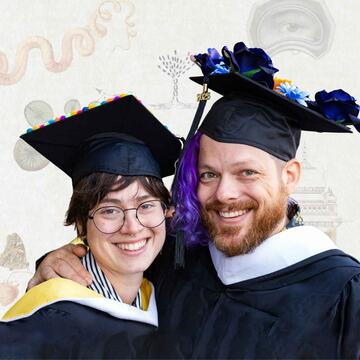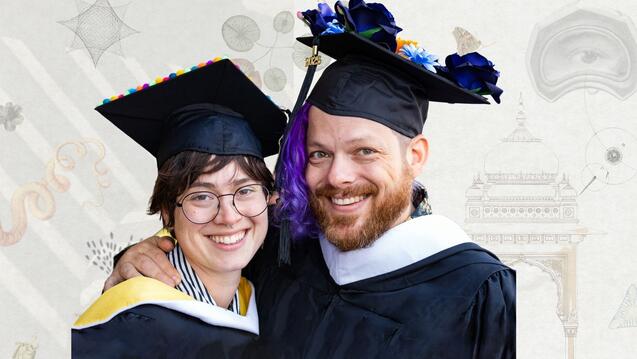
Bachelor of Science in Psychology
A degree completion program that trains you to make a difference in your community through a variety of healing and helping professions
Program Overview
Our Approach
The Bachelor of Science in Psychology at CIIS is a degree completion program that provides an in-depth understanding of an integral approach to psychology through experiential learning. We ask students to situate themselves, or consider who they are in relation to texts, materials, and subject matter they encounter in their studies. Our program welcomes a diverse student body and offers a variety of scholarships to supplement educational costs.
The B.S. in Psychology completion program provides the opportunity to focus on the scientific aspects of the field, including neurobiology, cognition, trauma, and consciousness. Additionally, our program fosters a global perspective by critically engaging both western and non-Western perspectives in psychological frameworks and practices.
Career Paths
The Bachelor of Science in Psychology from CIIS prepares you to think critically and thoughtfully about human behavior and community functioning. Our graduates pursue a wide variety of careers, including:
- Labor and public relations
- Casework and community outreach
- Early childhood and secondary education
- Employee relations and human resources
- Clinical coordination
- Public administration
- Substance abuse support
Curriculum
Our curriculum combines academic rigor and self-exploration. For the three-semester sequence, students remain with the same group in a cohort model that allows for the building of relationships and a creative, communal space to explore an integral approach to psychology. Throughout the program, our aim is to build upon the coursework through our primary values of community, critical thinking, and developing academic communication skills.
The degree culminates in a final project that involves interpreting, organizing, and presenting research and quantitative analysis of psychological data. Students are encouraged to choose projects that will be particularly meaningful to them or suited to their chosen career paths.
Featured Courses
Introduction to Transpersonal Psychology (3 units) This course introduces you to the field of transpersonal psychology including its scope, origins, and contemporary and future perspectives. You will study and engage with the field as a whole and explore and investigate the unique aspects of transpersonal psychology and its influence on current psychology. You will emerge from this class with a deeper understanding of transpersonal psychology and how it can support your future work.
Psychedelic Experience: Highs, Lows, and Transformations (3 units) This course examines the altered states of consciousness commonly characterized as psychedelic. Topics to be explored include the history of how such states have been used and understood in indigenous cultures and modern culture; the potentials, hazards, and integration of psychedelic experiences; and the past, present, and future of psychedelic research.
Introduction to Black Psychology (3 units) Explores the praxis of Black epistemology in the field of Black psychology. Examines the growth and development of Black psychology; its theories, methodologies, and practice are emphasized through an Africentric philosophical model. This course will enhance students’ skills in critical theory, transdisciplinarity, and cross-cultural psychologies.
-
Semester 1 | Fall
BSPSY 1110 Theories of Personality (4 units)
BSPSY 1111 Neurobiology (4 units) BSPSY 1112 Learning and Cognition (4 units)
General Education or Other Elective as Needed
Semester 2 | Spring
BSPSY 1115 Research Methods in Psychology (4 units)
BSPSY 1120 Cross and Multi-Cultural Psychologies (4 units)
BSPSY 1122 Introduction to Neurodiversity Studies (4 units)
General Education or Other Elective as Needed
Semester 3 | Summer
BSPSY 1113 Social Psychology (4 units)
BSPSY 1117 ACE/Adverse Childhood Experiences (4 units)
BSPSY 1119 Senior Project (4 units)
Entry Requirements
CIIS invites any students, including nontraditional students and adult learners, to apply to transfer to the University and complete their Bachelor of Science degree.
Fast-track your education and career with our Bachelor's to Graduate Accelerated Pathways. Earn both degrees in less time and at a reduced cost, while gaining a competitive edge in your field.
Required Application Materials
Your application is your opportunity to share who you are. To be considered essays and written responses must be your own authentic work.
Online Admissions Application: Begin the application process by submitting an online application. Starting July 1, a nonrefundable $30 application fee is required.
Minimum GPA: A GPA of 2.0 or higher in previous coursework is required. If you do not meet the 2.0 GPA minimum, a Letter of Recommendation will be required.
Transfer Credit Requirements: To be eligible for admissions, applicants must have completed a minimum of 54 transferable semester units. General education requirements are designed to give you a broad background in various disciplines.
Transcripts: Applicants must submit official transcripts from all accredited academic institutions attended. Transcripts may be sent digitally to materials@ciis.edu or mailed to CIIS, 1453 Mission Street, San Francisco, CA 94103 in their official, sealed envelope. If you have earned more than 54 units, but less than 60 units, we will also require a copy of your high school diploma, transcript, or GED certificate.
General Education Requirements: The completion of the following fields is not a prerequisite to enter the program, but rather an assessment of general education requirements necessary for graduation. We encourage you to meet as many of these requirements before entering the program, however, if you are lacking units, often you'll be able to take them as elective courses while enrolled in the program at CIIS.
- 3 units of college level math
- 9 units of humanities and art
- 6 units of natural sciences
- 6 units of expository writing
- 9 units of social sciences
- 3 units of oral communications
If you are uncertain about your eligibility, you can email your unofficial transcripts to the School of Undergraduate Studies for an unofficial transcript evaluation at jjohnson1@ciis.edu.
Writing Sample: You may choose between one of these options for your Admissions Essay.
- A short essay or research paper, that you feel particularly proud of and that shows your ability to write clearly and think critically (750 - 1,000 words)
- A short reflection answering the following questions (650 words maximum):
- What do you hope to achieve in this program, and why is it a good fit for your goals?
- How will the program’s resources and curriculum help you reach your career or personal objectives?
Letter of Recommendation (if GPA is below 2.0): One letter of recommendation from someone who can speak to your academic abilities or preparedness (preferred), or your work/professional experience. The letter should not be from a close friend, family member, or therapist.
Optional application materials:
- Resume
- A video introduction sharing more about yourself, your goals, and why you’re interested in CIIS
Events and Info Sessions
An Online Overview with Jennifer Gruczelak and Ronda Sharp
A Faculty-Led Info Session with Sara Salazar and Dee Reed
Attend our online event on February 21.


FAQ
-
A Bachelor's Degree Completion Program is an academic program specifically designed for students who started, but did not finish, their Bachelor's degree. Previously earned credits (a minimum of 54 credits) must be transferred in order to enter the program.
-
This program follows a semester format. You can find important dates and deadlines for each semester on the Academic Calendar.
-
Yes! Our Bachelor's to Graduate Accelerated Pathways allow students to complete graduate courses as undergraduates. The programs enable students to double-count the units for both degrees and pay undergraduate tuition. Students can save an estimated $20k in graduate tuition. Learn about the application requirements on our Accelerated Pathways page.
-
The online classes are asynchronous, so they do not meet in real time. Asynchronous classes offer students the flexibility to study in a self-paced manner. While most asynchronous classes still have submission deadlines, students can connect with materials, peers, and instructors on their own schedules within the parameters of the instructor's syllabus. In most cases, this means that course activities and assignments can be completed at any time during a given week of the course, rather than at a specific class meeting time.
-
Online courses at CIIS are delivered through the school’s learning management system, Canvas. Course menus in Canvas usually feature links to the syllabus and course content like lecture materials, readings, documents, websites, discussion forums, and other learning tools. Throughout the semester, instructors post assignment grades to the Gradebook in Canvas.
Instructors may occasionally hold a synchronous session held virtually during the semester and is conducted over an online platform such as Zoom or BigBlueButton.
-
Yes, a student that wishes to request a disability-related accommodation in order to attain their education at the school, including any specific accommodation to participate in the online learning environment, may submit a request for the accommodation to Student Disability Services at sds@ciis.edu.
The Office of Student Affairs will investigate the feasibility of providing the requested accommodation(s) for the student and will require the student to provide documentation of disability status.
All reasonable attempts will be made to address a request to accommodate a recognized disability to support the requesting student’s ability to attain education at the school.
-
Hardware:
- Computer with fast processing speeds with at least 4 GB of memory, 128 GB of storage
- Reliable high speed internet connection
- The most recent browser release (Chrome and Firefox are recommended)
- Headset and microphone
- Webcam
Skills:
- Basic computer skills
- Ability to use email
- Ability to use Microsoft Word, Excel, PowerPoint, etc.
- Search engine skills
- Ability to attach and upload documents and materials
The Office of Student Affairs will investigate the feasibility of providing the requested accommodation(s) for the student and will require the student to provide documentation of disability status.
All reasonable attempts will be made to address a request to accommodate a recognized disability to support the requesting student’s ability to attain education at the school.
-
The minimum number of transferable units required to enter the program is 54 units. CIIS accepts a maximum number of 84 transferable units, with up to 75 in the lower division and up to 40 in one subject area.
-
Within the limits cited above, we accept as transfer credit:
- Work in college level classes completed at regionally accredited institutions of higher learning in the U.S. and Canada or from other foreign institutions provided that acceptable documentation and evaluation demonstrates that these institutions and their courses are equivalent to regionally accredited institutions. International applicants must submit foreign transcripts to a foreign credential evaluation service for a "course by course" evaluation. CIIS accepts evaluations completed by the World Education Service (WES) and J. Silny & Associates, as well as from current members of the National Association of Credential Evaluation Services (NACES).
- Documented military training, granting credit based on the American Council on Education (ACE) guidelines.
- Test results from the College Level Examination Program (CLEP), Advanced Placement Exams, and Excelsior College Exams (ECE) may provide a student with a total maximum of 30 units. The CLEP exam is administered by the College Board, a non-profit organization which is known for its SAT, PSAT, and Advanced Placement programs. Applicants must provide the Institute with official test results.
Further criteria for transferable credit include:
- College Level Work: Courses must be college level. This means that courses that are developmental or college-preparatory will not transfer. Graduate level courses may be accepted as transfer credit; students should understand, however, that credit can be counted towards only one degree and that graduate credit applied to an undergraduate degree cannot then be applied again for a graduate degree. Associate of Arts (AA) credits are acceptable except for developmental or college-preparatory courses.
- Grade Criteria: Students must have earned passing credit or a grade of C or better. Coursework marked by a grade of D, D-, F, or NP (No Pass) or incomplete work is not transferable.
- Physical Education: CIIS does not accept physical education credit except in specifically defined areas: dance, yoga, and some forms of martial art.
- Double Credit: Students cannot receive credit twice for the same course of study. This is most easily determined when courses are standardized mainstream college curricula and bear comparable or identical names. It may be less easy to determine in other circumstances. More specific courses, for example, "Modern European Art," are considered as fully separate from survey courses, such as, "Western Art Through The Ages," even though there may be some duplication of material. In certain cases, course descriptions may need to be procured to determine content overlap.
- Single Subject Limits: Because the BA completion degree is interdisciplinary, students must demonstrate some balance in their studies. A limit of 40 units, or 1/3 of the degree, has been set in this area. However, it is important to apply this criterion thoughtfully. Subjects which are inherently interdisciplinary such as Women's Studies or some ethnic studies may be viewed differently. Simply because some studies may share certain historical or theoretical background may not make them a single subject.
- Extension Credit: CIIS accepts a maximum of 12 units completed in university extension programs for professional development. These units are reviewed on a case by case basis. Students should be aware that there is no guarantee that these units will be accepted. Please note that Continuing Education Units (CEU) units are not transferable.
-
You can submit your transcript(s) to our admission counselor for review. These do not need to be official transcripts, but students will need to submit official transcripts with their application.
-
Yes, as long as they meet the criteria listed above and you can present an official transcript. The institution(s) you attended may need some extra time to retrieve your records, but the credits you earned do not expire.
-
No, students can meet their GE units while in the program, including the math GE requirement.
-
The exact length depends on a student's number of transfer units and what workload a student wants to carry per semester, which typically ranges between 12-15 units per semester. Most students will complete the program in 3 semesters, with some needing 4 semesters. To graduate, a student must earn 120 units and complete the core curriculum, as well as all general education requirements (if these haven't been met prior to entry into the program).
-
While full-time study is preferable, part-time study is possible. To fully understand the implications of less than full-time enrollment, contact our admission counselor.
-
All online courses in the Bachelor of Science in Psychology degree completion program require a substantial amount of student involvement. Although there is some flexibility in schedule, online classes are not self-paced and have frequent due dates.
Instructors’ expectations of student online participation in classes are outlined in their individual syllabuses.
However, every student is different and the amount of time they will spend on reading, writing, preparing, and working on projects may differ. A good rule of thumb, however, is to plan for 2 hours per week of preparation and study time for each unit of credit (in addition to time spent in the online classes).
For example, if a student takes only the core curriculum of 12 units, they can expect to spend (12 x 2 =) 24 hours per week on coursework. Similarly, if a student takes the core curriculum, as well as another 3-unit class, they can expect to spend (15 x 2 =) 30 hours per week on coursework.
-
Yes, a fixed tuition rate will be set for a maximum of four consecutive semesters. Students need to remain in good academic standing to be eligible for the fixed tuition rate. Find more detail on our Policies and Procedures page (under the Student Learning Policies accordion).

Take the Next Step
For over 50 years, CIIS has been at the forefront of education that integrates rigorous science, innovative scholarship, and social justice. You will learn from faculty at the forefront of their fields, local artists and activists, and a community of peers as passionate and dedicated as you. There’s never been a better time to be here – let’s build a healthier and more equitable world.




